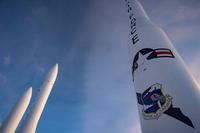Cleanup of chemicals at Fairchild Air Force Base could be delayed through 2032 as part of a nationwide directive.
Nearly 140 military installations across the country will delay PFAS cleanups under order from the Department of Defense, as first reported by the New York Times.
Known as "forever chemicals," perfluoroalkyl and polyfluoroalkyl substances are a set of human-made chemicals used in thousands of products over the decades. High levels have since been linked to cancers, heart disease, high cholesterol, thyroid disease, low birth weight and other diseases.
The chemicals have been used in firefighting foam at military bases. High levels of the chemical have been detected throughout the West Plains — likely originating from Fairchild Air Force Base and Spokane International Airport. Both have used a firefighting foam linked to PFAS, which washed away into the West Plains groundwater.
Plans for cleanup of the groundwater below and near Fairchild have been ongoing since 2017. So far, the base has completed a preliminary assessment and is in the final stages of completing an investigation into the impact of PFAS on the base and surrounding area. Once that is completed, a feasibility study would be conducted on the different ways to clean up PFAS contamination, and only then would the cleanup take place.
The feasibility study and remedial investigation had previously been slated to be completed by July 2026. The new Defense Department timelines, released internally in March but only posted publicly in recent weeks, push out completion of these steps to June 2032. Final cleanup of Fairchild could occur even later.
Such a delay would mean 15 years pass between the West Plains PFAS discovery in 2017 and action to clean up the Fairchild contamination.
John Hancock, West Plains homeowner and president of the West Plains Water Coalition, said such a significant delay is unacceptable.
"It feels like the Air Force would really choose not to do anything rather than make some moves towards the additional safety of their neighbors," he said.
According to Hancock, "no significant action" has been taken by the base to clean PFAS contamination.
The community activist sits on Fairchild's Restoration Advisory Board, which provides input on the cleanup process. At the most recent meeting, the Air Force presented a draft remedial investigation, which overviewed "much of what we already know," Hancock said.
"The remedial investigation is not a plan, it's just an investigation" he said. "Whenever we ask about a plan, we get told there is no plan until the investigation is complete."
The Air Force has provided 109 filters for surrounding homes' drinking water, which will last for at least another five years.
An Air Force spokesperson did not respond to a request for comment Wednesday afternoon.
Under direction of the Washington Department of Ecology, the Spokane International Airport is also conducting a remedial investigation and feasibility study ahead of any cleanup efforts.
The airport is overseen by a board jointly controlled by Spokane city and county governments. Last month, the Department of Ecology found both the city and county to be liable for PFAS cleanup at the airport.
In a statement, city spokesperson Erin Hut said the city will continue to work with the airport and county to address issues raised by Ecology.
" Spokane International Airport, under the direction of the Spokane Airport Board, is the sole operator of the airport and has the lead with respect to direction provided by the state of Washington related to the PFAS investigation and response," she said.
© 2025 The Spokesman-Review (Spokane, Wash.). Visit www.spokesman.com. Distributed by Tribune Content Agency, LLC.













